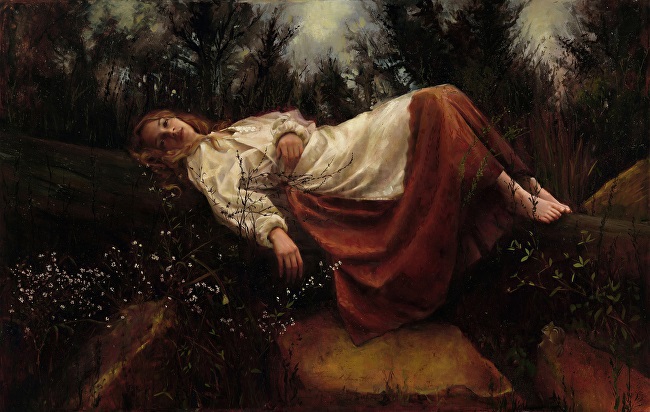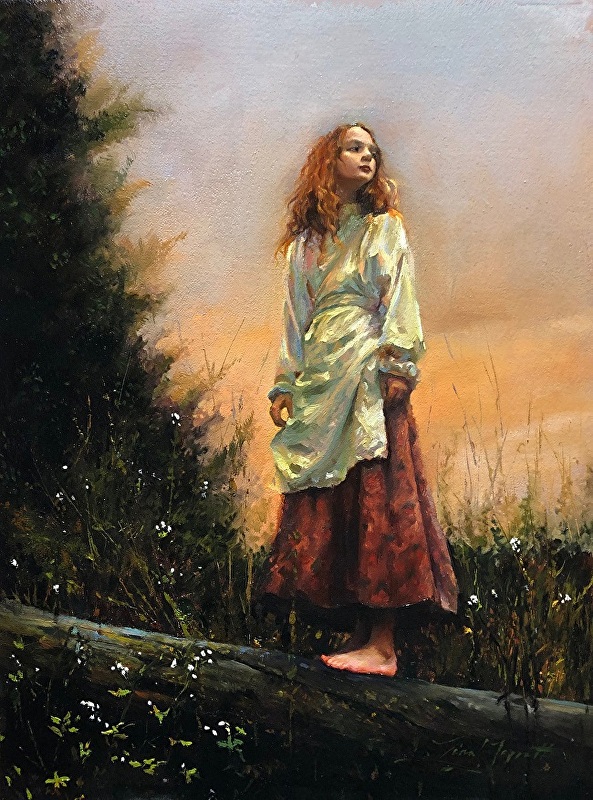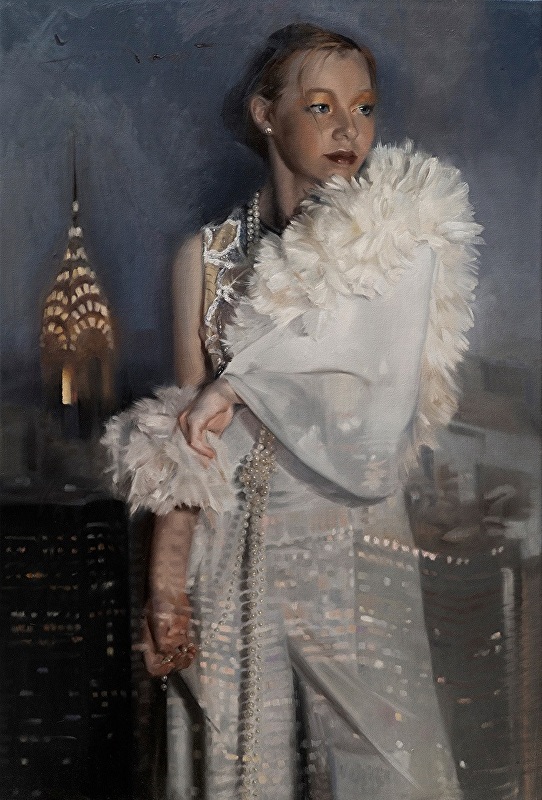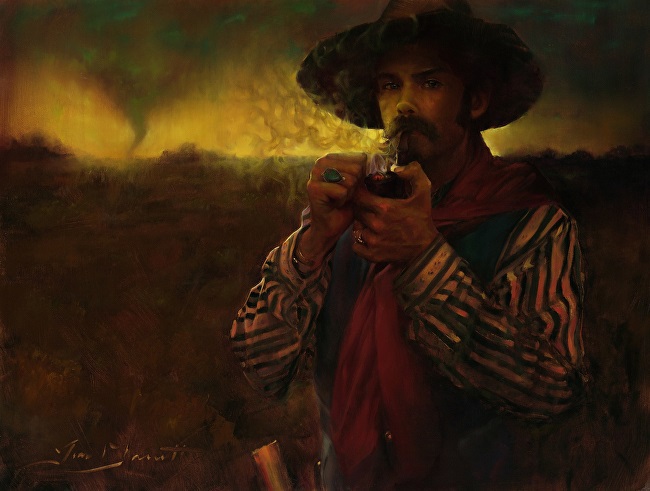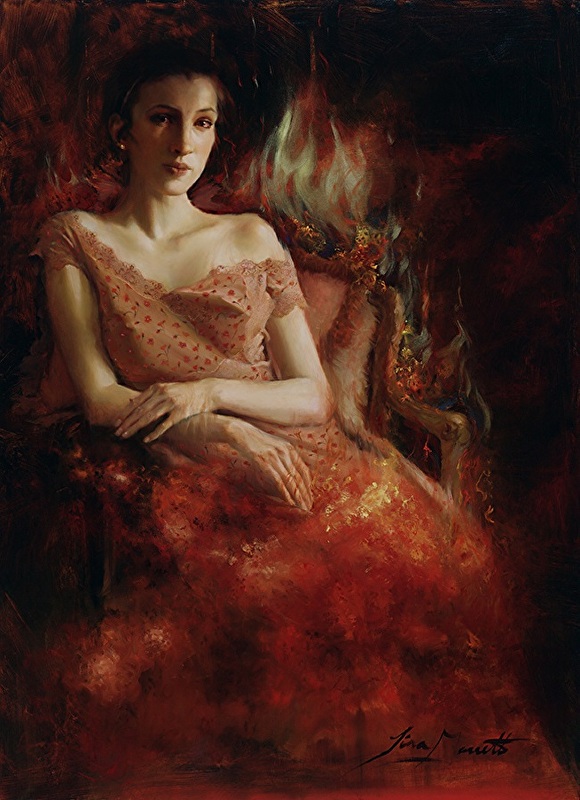You seem like a planner; how much of the success you've reached would you say has been a result of planning and how much has been unplanned serendipity?
That's a great question. I've had certain things happen that seemed like chance but at the same time weren't: I'll give an example. The first series I did was a series of figurative works called Vintage Nouveau - those paintings only happened because I as at another painting show and I saw this beautiful figure of a woman from the back, with hair all the way down to her calves and I could just tell from her posture how lovely she was. And so I went over to her to ask her if she would mind sitting for me, maybe we could go outside and we could get some pictures or something - when I tapped her on the shoulder and she turned to me I saw she was about 80 years old, this gorgeous old woman wearing 7-inch stiletto heels and long flowing hair! And me going up to her and starting a conversation turned into her coming over to my home for a day and giving me access to her great-aunt's collection of original 1920s and 30s clothing and making an entire series based off that clothing. In a way that was serendipitous, but it took the spark of my own audacity to talk to a total stranger and ask them something they might say no about. I guess I don't believe there's much that will just fall into your lap; that you have to at least try to make your own destiny. You have to take the risk of being told no.
That's a great answer, you took initiative and something genuinely unexpected came out of it. What is the best part of reaching this stage in your career, when you already have recognition and you don't feel like you're working as hard? And what's a challenge?
Well, I think if I had any kind of an ego issue I'd be in trouble. If I started worrying about what people thought of me, I'd be in trouble. That one's hard for me. That's something I watch in myself, to accept the fact that my work may not be everyone's cup of tea. I think that's something that can hang up a lot of painters, feeling like your work needs to be loved by everyone or you're not good. You have to figure out what your "enough" is, and my "enough" is making a living for my family. I kind of surpassed my goal of being collected; anything that happens beyond that is just icing on the cake. The best part of being at this stage of my career is the relationships that I've made along the way. I love the people and the group of artists I've met in the past few years. I don't know of many other jobs where your colleagues genuinely cheer you on and they are a part of your lives like this. Sharing the excitement, painting together, learning, I always feel so energized after I'm with them. Being a painter is a very lonely job, it can be isolating and I counteract that with the teaching that I do and the shows I attend. That circle of friends that "get" you that's the best part of being a painter.
I can see that dealing with negative opinions could become more of a challenge as you become more well known. Do you still deal with not being satisfied with your work yourself, and what do you do with that, since people expect great work from you now?
I'm actually more terrified that people will expect me to make a greaterquantityof work then about the greatqualityof work. Because I believe that given enough time I could make a masterpiece that could make you cry, but ask me to make ten and I might have a breakdown! I'm concerned about the time factor. I've learned to build a community of friends and mentors who can tell me when a painting is done. When I'm reaching the end of a piece I'll reach out to a few and ask them if it meets the standard they'd expect from me and more often than not they'll tell me I've overshot it! So I'm learning more and more to reach out for that kind of input. Successful painters keep their ears to the ground and listen to what their market is telling them, and the market includes not just collectors but your students and mentors too. Because you are the commodity, so if your community is telling you something, take it with a grain of salt, but listen to it. And I'm hearing from my community that my perfectionistic tendencies are slowing me down, so I'm working on that. You might ask how to find that kind of mentor; when you're out at these events and you meet such-and-such and learn they work for this magazine or curate for that museum, you say "I would love to get your input on my work, can I get your business card, can I give you mine?" and then you actually do that, send them an email with a picture and say "This is what I had on my mind, I'd love your input but I know you're super busy so if you don't get back to me it's fine." As long as you're super gracious since you're bothering them with something they don't get paid for, then you should get some feedback that you can decide if you want to use or not. That's how I move past my indecisions; I have my set of professionals that I trust who have years of experience behind them. It's only a bad situation if you get stuck inside the feedback loop of your own head and you tell your self it isn't any good or it will never be finished and then you end up believing it isn't any good and never finish.
What is a big goal that at the beginning of your career that might not have seemed possible and is still a big goal for you?
Well when I first started painting my husband took me to the Prix de West, where Jeremy Lipking was showing some paintings. I didn't even think until this year that I would ever ever be allowed to show in the Prix de West. But this year I submitted an application and I'll find out in August if I'm admitted. The Prix de West is the best of the best in Western American Art and for me it's a huge achievement to show there, so that's my next goal. I've been self-represented the entire ten years I've been painting and adding the Prix de West on to the sales I make on my own would be just the right level of representation, where I would show just once a year but have access to a huge collector base. I'm really excited to hear back - it's incredibly exclusive, so it might take a few years to get in, but I finally had the guts to apply so that's a start!
Last question: Who are three of the most influential artists for you from the past and from today?
I could go on and on, there are so many great painters today that I follow. Top of the list is Richard Schmid; he painted everything consistently well, there's stellar quality throughout his career; he has pieces from the 1960s to 2015 and none of it feels dated, he's always Richard and the quality is always there. Also not just his paintings but his entire philosophy of painting is very influential for me. And then his wife Nancy Guzik; she has a very tender sensibility in her work that I hope to get to in the next 25 years. It's my goal to take people into the same atmosphere that she's able to create. And Jeremy Lipking; I love the way he's able to create portraits of his children and 'unportraitize' them, make them iconic and timeless. As a mother, Lipking has shown me that you can embrace your family in your work in an authentic way, and genuinely celebrate what's happening in your daily life through your work while making a living out of it. His work remains very authentic and personal but also very marketable, and I think that's a masterful perspective for any artist working today. Working with so many artists, especially women, I hear this dilemma all this time, the balance between being a parent and being a painter. I look at Lipking and I think, "There's how to do it!" If you're immersed in this portion of your life, why try to paint something outside of that and apologize to your kids for not being with them, or separate your family from your work life?
For painters in the past, I really love Isaac Levitan; he is where I want to be in my landscape painting some day. I hesitate to name Sargent and Sorolla, because everyone likes them, but I have many books on them - although in all honesty, when I sit down at the easel, the book I turn to most frequently is still Schmid'sAlla Prima. Right now I'm working on a big 54'' portrait of a lady riding a horse so I'm looking at Remington. I keep a folder on my phone called "How the masters did it" and when I'm starting a new painting I'll take the new concept I have and compare it to the masters I want to be like, and immediately, even at the concept stage, I can tell where my piece is lacking; it's very eye opening. Fantin-Latour and Boldini are two more favorites; they're magic on the canvas. When I saw a Boldini in person at the Clark, I bawled like a baby. Anybody that has control of composition, control of light and dark, and dynamic brushwork has my attention.
One last Schmid story, because this made all the difference in the way I look at artwork I admire: I was sitting at the kitchen table one night, Nancy and I were getting ready to go out, and I was looking over his shoulder at this little painting he did of a pine tree on a grey evening. And I said to him "Oh my gosh, it's so beautiful, I feel like I can feel the wind rocking through the trees, it's so romantic. And he replied, "My darling, that's nonsense." And I was so embarrassed, thinking "Oh no I said something horrible and stupid to Richard Schmid!" But he said, "Look at it again and tell me in practical terms,what do you see?" So I looked again very carefully and said "Well, I see lots of grayish green but nothing truly green; and I see pine needles everywhere but not a sharp edge anywhere; everything's very muted and harmonized, there's nothing standing out," and he said "Exactly, so none of this nonsensical conversation with yourself when you're looking at the Masters. The Masters showed you exactly how to do it in the work, so when you look at the Masters' work ask yourself in practical terms what they did, instead of just oohing and aahing over it." And that moment changed how I made my own paintings and how I compared it to the work of the masters - it helped me take a practical approach to understanding the elements they were actually using and where those elements are missing in my work. And the great part is that any artist can figure that out, and each one of us will observe and pick out different elements in the work of the masters to use, because each one of us has individual taste. So I'm literally crafting my own work as I look, because I'm selecting the specific elements to aspire to.
Many thanks to Tina Garrett for this interview! You can view her websitehere or follow her on Instagramhere.
